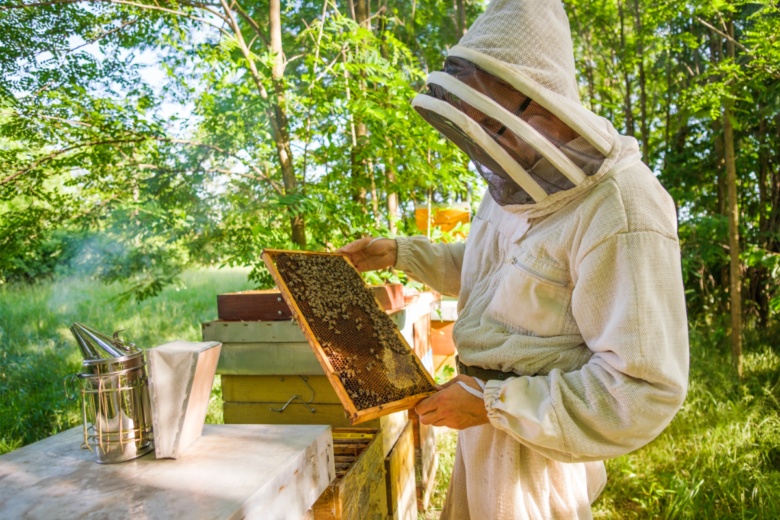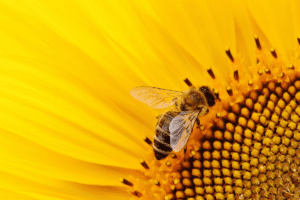Organic and sustainable beekeeping represents a mindful approach to honey production that prioritizes environmental health, the well-being of bees, and the quality of the end products. Unlike conventional beekeeping methods that often rely on synthetic chemicals and intensive practices, organic and sustainable beekeeping seeks to harmonize with nature, fostering a symbiotic relationship between the beekeeper and the bees.
Definition and Importance
Organic beekeeping is defined by its adherence to practices that avoid the use of synthetic pesticides, antibiotics, and genetically modified organisms (GMOs). Instead, it focuses on natural treatments and ecological balance to manage bee colonies. Sustainable beekeeping extends this philosophy by emphasizing practices that ensure the long-term health of both the bee populations and their environment. This approach is crucial as it helps mitigate the decline of bee populations, which are vital for pollination and the health of ecosystems.
The importance of organic and sustainable beekeeping cannot be overstated. Bees play a critical role in pollinating plants, which directly impacts food production and biodiversity. By adopting organic and sustainable practices, beekeepers contribute to the preservation of these essential pollinators and support the overall health of the environment. Furthermore, consumers benefit from high-quality honey and bee products that are free from harmful residues, promoting healthier lifestyles and more sustainable food systems.
History and Evolution of the Practice
The roots of beekeeping trace back thousands of years, with early practices evolving from wild honey hunting to more structured forms of apiculture. However, the modern concept of organic and sustainable beekeeping began to take shape in the 20th century as awareness grew about the environmental impacts of conventional agricultural practices and the importance of biodiversity.
In the 1970s, as the organic movement gained momentum, beekeepers started to recognize the need for more environmentally friendly methods. Pioneering apiculturists advocated for the elimination of synthetic chemicals and promoted the use of natural remedies for managing bee health. Over time, these ideas coalesced into formal organic standards, which were further refined as research into bee health and environmental stewardship advanced.
Today, organic and sustainable beekeeping is a growing field that combines traditional knowledge with modern scientific insights. Beekeepers worldwide are adopting these practices not only to improve the health of their colonies but also to contribute to global efforts in combating climate change and environmental degradation. The evolution of this practice reflects a broader shift toward more sustainable and ecologically responsible approaches in agriculture and food production.
Benefits of Organic and Sustainable Beekeeping
Positive Environmental Impact
Organic and sustainable beekeeping has a profound positive impact on the environment. By avoiding synthetic pesticides and chemicals, these practices reduce pollution and chemical runoff that can harm surrounding ecosystems. This approach supports soil health, water quality, and overall biodiversity. Moreover, sustainable beekeeping promotes the planting of diverse flora, which not only provides better nutrition for bees but also enhances the health of the local environment.
Quality of Honey and Derived Products
Honey produced through organic and sustainable methods is often superior in quality compared to conventionally farmed honey. It tends to be richer in flavor and more nutritious, with fewer chemical residues. The same principles apply to other bee products such as beeswax, propolis, and royal jelly. These products, free from synthetic additives, are sought after for their purity and health benefits, making them more desirable in niche markets and among health-conscious consumers.
Bee Health and Biodiversity
The health of bee colonies is greatly enhanced through sustainable practices. By focusing on natural feeding and avoiding harmful chemicals, beekeepers help maintain strong, resilient bee populations. This, in turn, supports greater biodiversity as bees play a crucial role in pollinating a wide variety of plants. Healthy bee populations contribute to the stability and productivity of ecosystems, benefiting everything from wildflowers to agricultural crops.
Preparation and Planning
Choosing the Ideal Location
Selecting the right location for an apiary is crucial for the success of organic and sustainable beekeeping. Ideal sites are typically away from agricultural areas that use pesticides, with access to diverse forage plants and clean water sources. Additionally, the location should offer protection from extreme weather and predators while providing adequate space for hive management and expansion.
Climate and Geographic Considerations
Climate and geography significantly influence beekeeping practices. Beekeepers must consider local weather patterns, temperature ranges, and seasonal variations when planning their apiary. In regions with harsh winters or extreme heat, special provisions may be necessary to protect the hives and ensure the bees’ survival. Understanding these factors helps in planning hive management strategies and selecting appropriate bee species.
Selection of Native Bee Species
Choosing native bee species for an apiary aligns with the principles of organic and sustainable beekeeping. Native bees are better adapted to the local environment and are more resilient to local pests and diseases. They also contribute to the preservation of regional biodiversity. By focusing on native species, beekeepers can enhance the stability and productivity of their colonies while supporting local ecosystems.
Sustainable Management Practices
Natural Feeding of Bees
In organic and sustainable beekeeping, providing natural food sources for bees is essential. This means avoiding artificial feed and instead promoting the growth of diverse nectar and pollen sources in the surrounding environment. Beekeepers can also implement practices such as planting cover crops and maintaining wildflower meadows to ensure a steady supply of natural nutrition for the bees.
Pest and Disease Control Without Chemicals
Effective pest and disease management is achieved through natural methods. This can include the use of biological controls, such as introducing beneficial insects, and employing physical barriers to protect hives. Regular monitoring and maintaining strong, healthy colonies also help in preventing outbreaks. By avoiding chemical treatments, beekeepers reduce the risk of harmful residues and promote a healthier hive environment.
Techniques to Minimize Bee Stress
Minimizing stress on bee colonies is a key aspect of sustainable beekeeping. This involves gentle hive management practices, such as minimizing disturbances and avoiding overharvesting honey. Additionally, providing ample space within hives and ensuring proper ventilation can help reduce stress and improve overall hive health.
Use of Organic Materials
Building Hives with Sustainable Materials
Constructing hives from sustainable materials is a fundamental aspect of organic beekeeping. This includes using natural, untreated wood and avoiding synthetic components. Sustainable materials not only reduce environmental impact but also contribute to the overall health and longevity of the hives.
Natural Treatments for Hive Wood
Treating hive wood with natural products, such as essential oils or wax coatings, helps protect the hives from pests and weathering without resorting to harmful chemicals. These treatments extend the life of the hives and ensure that the environment around the apiary remains free from synthetic pollutants.
Relationship with Local Flora
Importance of Plant Biodiversity
Plant biodiversity is crucial for the health of bee colonies. A diverse range of flowering plants ensures that bees have access to a variety of nutrients throughout the year. By supporting local plant diversity, beekeepers enhance the quality of the nectar and pollen available to their bees, which in turn supports stronger and healthier colonies.
Native Plants and Their Role in Bee Health
Native plants play a vital role in maintaining bee health. They are adapted to local conditions and often provide the most nutritious and plentiful food sources for bees. By incorporating native plants into their surroundings, beekeepers can create a more supportive environment for their colonies.
Planting Techniques that Benefit Beekeeping
Beekeepers can employ specific planting techniques to further support their apiaries. This includes designing floral gardens that bloom at different times of the year to provide a continuous food source for bees. Implementing practices such as planting hedgerows and creating wildflower patches can also enhance the habitat for bees.
Certification and Regulation
Organic Beekeeping Certifications
Obtaining organic certification for beekeeping involves meeting specific standards and regulations that ensure the practice adheres to organic principles. Certifications are typically provided by recognized bodies and require adherence to strict guidelines regarding hive management, treatment of bees, and production practices.
Environmental Regulations and Standards
Compliance with environmental regulations is essential for sustainable beekeeping. This includes following local and national guidelines related to pesticide use, waste management, and habitat protection. Understanding and adhering to these regulations helps ensure that beekeeping practices are environmentally responsible.
Processes for Obtaining Certification
The certification process for organic beekeeping involves several steps, including applying to a certifying body, undergoing inspections, and maintaining detailed records of beekeeping practices. Beekeepers must demonstrate their commitment to organic standards and be prepared for periodic evaluations to maintain their certification status.
Challenges and Solutions in Sustainable Beekeeping
Main Challenges Faced by Organic Beekeepers
Organic beekeepers face various challenges, including managing pests and diseases without synthetic treatments, dealing with fluctuating floral resources, and ensuring hive health in diverse climatic conditions. These challenges require innovative approaches and adaptability to ensure the success of organic and sustainable practices.
Practical Solutions and Innovations
Addressing these challenges involves adopting practical solutions and innovations. This can include developing new pest management strategies, enhancing hive designs, and collaborating with other beekeepers to share knowledge and resources. Ongoing research and technological advancements also play a crucial role in overcoming obstacles.
Case Studies of Successful Beekeepers
Examining case studies of successful organic beekeepers provides valuable insights into effective practices and strategies. These examples highlight the benefits of innovative approaches, share lessons learned, and offer inspiration for those looking to implement or improve their own sustainable beekeeping practices.

Hi, I’m James Stevan, an avid beekeeper with over a decade of experience in apiculture. My passion for bees drives me to share practical tips and insights on sustainable beekeeping. Join me as we explore the fascinating world of bees and their crucial role in our ecosystem.




